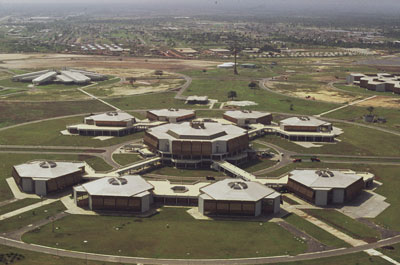
“Development” from the Periphery. Architectural Knowledge Exchange Beyond US/ Soviet Bipolarity, 1950s-1980s Session in the framework of the EAHN 2nd International Meeting, Brussels, June 1, 2012.
Session chairs: Rachel Kallus (Technion, Israel Institute of Technology) and Łukasz Stanek (Institute of History and Theory of Architecture, Swiss Federal Institute of Technology)

Trade Fair in Lagos (Nigeria), designed and constructed by the Yugoslav firm Energoprojekt (1976), in "Energoprojekt: 60 Years of Success" (2011).
This session aims to put into question the concept of “development” by focusing on the post-WWII exchanges of architectural knowledge between the “peripheries” struggling for alternative scenarios of modernization rather than subscribing to one model promoted by the centres: the United States or the Soviet Union. Even if this period cannot be understood without accounting for the Cold War polarities, this session challenges the reduction of postwar architecture and planning practices to the US or Soviet political domination and postulates a more differentiated view on alliances among professionals from modernizing countries away from central hubs.
Focused on post-colonial modernization and nation-building processes, this session reviews global knowledge exchange from the 1950s to the 1980s in order to unpack and expand the concept of “development.” We address networks of professional knowledge transfer in order to offer a differentiated view on the agency of experts serving their countries as much as their own professional and personal goals.
How and on what institutional bases have professional networks been set? How did they mediate local nuances of geopolitical contexts within the postwar global division of architectural labour and the flows of “development aid”? What were the interactions between such networks and governmental organizations, educational systems, and local communities? How did competition and cooperation between professionals affect the production of new architectural knowledge? In what ways did global knowledge transfer influence and challenge architecture practices and discourses of post-WWII modernisms?
The focus on global knowledge exchange draws attention to the role of architecture and architects in world affairs: while this session challenges the historically entrenched vision of architecture knowledge flow from “developed” to “developing” countries, it also affirms a very contemporary call for contextual cosmopolitism and rooted universalism.
Program:
9.00-9.15: Łukasz Stanek, Introduction: Multipolar Architecture Transfer in the Cold War
9.15-9.35 Mirjana Lozanovska, The intriguing and forgotten exchanges between Yugoslav architects and Kenzo Tange’s Office in the master plan for the reconstruction of Skopje
9.35-9.55 Petros Phokaides, Panayiota Pyla, Peripheral Hubs and Alternative Modernizations: Planning for Tourism in Postcolonial Cyprus
9.55-10.15 Ayala Levin, Fast-Track Modernity: Israel’s Construction Aid on Sierra Leone’s Eve of Independence
10.15-10.35 Kim De Raedt, School Construction and development aid in postcolonial Africa. Mapping transnational networks of architectural expertise and practice
10.35-10.50: Rachel Kallus, Response: “Development” in and from the Periphery
10.50-11.45 Discussion




